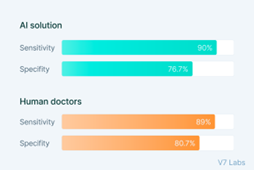Skin cancer is one of the most common types of all cancers. Melanoma may be the rarest subtype, but it will be responsible for over 7000 deaths this year, in the United States alone. Here’s the better news.
Up to 86% of melanoma skin cancer types are preventable and well-treated if detected at the early stage. As you've probably guessed, artificial intelligence and machine learning can be of help.
Yet, the devil is in the details. Early-stage melanoma is difficult to distinguish from benign moles and other malignant neoplasms. And that is why doctors are experimenting with AI technology to gain extra decision support. The International Skin Imaging Collaboration (ISIC) has been a driving force in creating annotated datasets of skin lesion images to accelerate the quality of computer-aided research.
Commoditized access to cloud computing technologies and active knowledge sharing among machine learning professionals also helped significantly accelerate skin cancer research over the past five years.
Here are some encouraging findings:
In 2019, researchers used a convolutional neural network (CNN), built on InceptionV3 and ResNet50 architectures to analyze close-up and dermoscopic medical imaging datasets. The goal was to determine non-pigmented skin cancers. After training the model, they compared how artificial intelligence performed against 95 dermatologists.
What was the result? The AI delivered the same levels of accuracy as human experts. The same levels of accuracy. Let that sink in for a second. And that’s not all—the tool also performed better than beginner- and intermediate-level dermatologists.
Another scientific group pitted InceptionV4 (a deep learning architecture approved for medical purposes by the European Union) against a group of human dermatologists. Both were asked to diagnose 100 test cases (including 60 benign and 40 malignant skin lesions) by first reviewing a dermoscopic image and then additional clinical close-up images and clinical information.
Here are the results (with a dermoscopic image only):

With more healthcare information available, the mean sensitivity of humans increased to 94.1%, but the mean specificity stayed the same. However, the CNN system also did slightly better than doctors this time, scoring 95% sensitivity. Yet, more experienced dermatologists did better than an algorithm in many cases.
